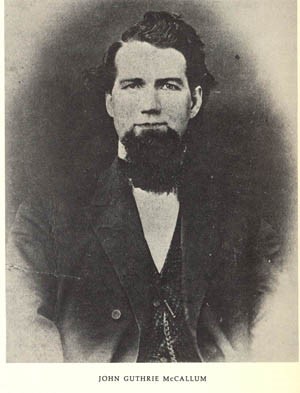Biographical Details
Date of Birth: August 10, 1826
Birth Location: Vevay, IN, USA
Major Study: Law
Graduation Year(s): 1848
Degree(s) Earned: Bachelor of Laws
Date of Death: February 5, 1897
Death Location: Palm Springs, CA, USA

Date of Birth: August 10, 1826
Birth Location: Vevay, IN, USA
Major Study: Law
Graduation Year(s): 1848
Degree(s) Earned: Bachelor of Laws
Date of Death: February 5, 1897
Death Location: Palm Springs, CA, USA
John Guthrie McCallum’s family were Scottish immigrants; they settled in Indiana amidst the Swiss immigrants of Switzerland County. His family were Seventh Day Baptists. Ferret Dufour wrote about the McCallums, “It was rather novel to the citizens, to travel up ‘Long Run’ on Saturday and see none of those people stirring about, and then passing on Sunday, to see every one able to do any work out in the clearing, chopping, piling and burning brush and rolling logs.”
McCallum’s father operated one of the first steamboats upon the Ohio River. His father died when he was just six years old. At the age of eight, McCallum went to work on the steam sawmill engine for the family farm to learn the trade of engineer. He resided in Switzerland County, Indiana, for a time. He read books and was self-educated. He finally saved up enough from his farm work to go to college, first in Ohio, then back in Indiana.
McCallum graduated from IU with his law degree in 1848. His two elder brothers left for the Gold Rush in California; they arrived in San Francisco on the Ohio in 1851. His mother, Ellen, sent him to bring his brothers home; he had just begun his law practice in Indiana. By the time his ship arrived in California in 1854, McCallum found both his brothers had died. Seeing the opportunities for legal work around Placerville, he decided to stay on. He was elected to the California State Senate, managed the editorial staff of The Georgetown Weekly News in Eldorado, and helped frame the new state of California’s first Constitution. He was one of two electors at the time of President Lincoln’s second inauguration who took the vote to Washington, DC, attended the Inaugural Ball, and was present when Lincoln was assassinated. McCallum was registrar of the U.S. Land Office in Sacramento. He also served his country as Indian agent to the Mission Indians. After retiring his commission, he moved to Oklahoma (then Indian Territory). He treated the Indians with compassion and made friendships in areas where no White man had ever lived before. His biographer wrote, “He came not as a conquering White as so many others had come to Indian Territory; he came as a friend of the Indians.”
At age fifty-seven, McCallum went on a search in Southern California for a place to retire comfortably. Will Pablo, his Indian guide, interpreter, and friend, led him to an oasis with clusters of tall palms, a land of “eternal sunshine and warm, healing waters.” McCallum purchased the land, and it was later developed by his daughter, Pearl, into the world-famous city of Palm Springs.
McCallum felt an immediate affinity for the welcoming oasis. And so it was that Palm Springs, as it would eventually become known, was born. His only neighbors were the Cahuilla Indians.
Together with his Native American neighbors, McCallum built, and he spent sixty thousand dollars on, a nineteen-mile-long ditch to carry water from the Whitewater River, lined with stone and sections of redwood flume, and planted oranges, grapes, apricots, and alfalfa. It was an innovative, large-scale irrigation project ahead of its time. An eleven-year drought wilted his crops, bronchial disorders and TB plagued the non-Indian inhabitants, two of his five children died (in their twenties), and absentee owners defaulted on their loans. He did not live to see the fruits of his labor, but he told his wife and remaining children to hold onto the land at all costs. He was buried in Los Angeles, California.
The weather, American prosperity, the entertainment industry, and wise family investments all led to the success of the region after the turn of the twentieth century. McCallum’s daughter, Pearl, and her husband commissioned the young Frank Lloyd Wright, Jr. to design the Oasis Hotel, which they built as a memorial to her father. Most famous among Pearl’s accomplishments was the renowned “pink mansion,” where she lived out her years. Pearl gave generously to a number of charities; she was one of the charter members of the Palm Springs’ Pathfinders, which helped boys and girls in the area. She donated the land that is the site of the Palm Springs Woman’s Club[house]. She helped the club set up their scholarship program and one day told its president, “All right, you select one boy and send him to college through the club, and I will take the other one and send him to college myself.” As a tribute to her, the club holds “Auntie Pearl Day” each fall.
The McCallum Desert Foundation still exists in McCallum’s memory. It has awarded over fourteen million dollars in grants, including educational scholarships to high schools. More than fifty of McCallum’s direct descendants were living as of 1984; it is likely in the hundreds today.